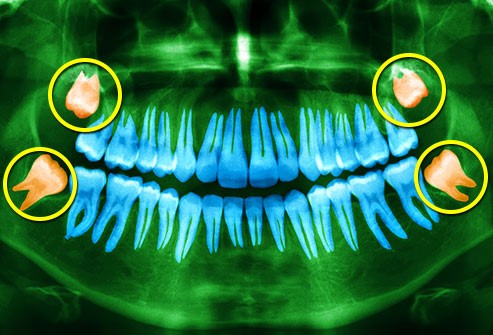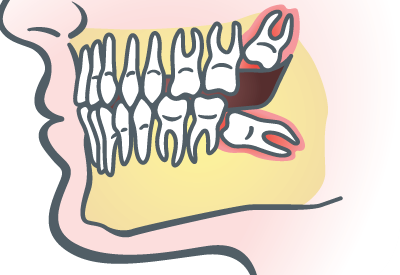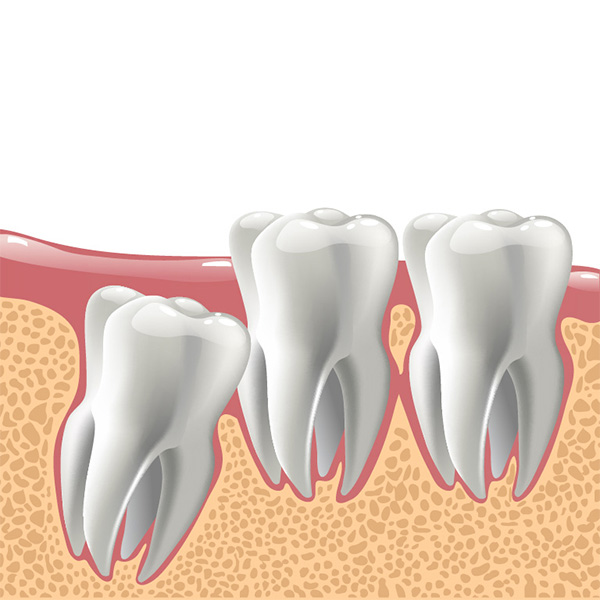Why are wisdom teeth called wisdom?
Although formally known as third molars, the common name is wisdom teeth because they appear so late – much later than the other teeth, at an age where people are presumably “wiser” than as a child, when the other teeth erupt.
Wisdom teeth, which are also known as third molars, usually appear between ages 17 to 25. They’re the last teeth to erupt and, for some people, they never appear or cause problems. Many people have impacted wisdom teeth, which don’t have enough room to erupt in the mouth.

Wisdom Teeth Symptoms
Are your wisdom teeth coming in? Wisdom teeth symptoms can include:
- Pain at the back of the mouth, behind the molars. This pain will gradually increase with time as the wisdom teeth continue to grow in misaligned or sideways, pressing on nerves and bone, and crowding surrounding teeth.
- Other wisdom teeth symptoms include pain, redness, tenderness and/or swelling around the site. As wisdom teeth begin to erupt through the surface of the gums, this allows bacteria to enter through open tissue, which can result in infection. Oral infections have been shown to affect your overall health as well.
What is an impacted wisdom tooth?
It’s also possible for wisdom teeth to become impacted, a state in which the jaw bone or neighboring teeth block the teeth from erupting. They become trapped in place as their roots continue to elongate, and the longer they remain impacted, the more likely they are to cause problems for your oral and general health. Wisdom teeth symptoms due to impaction include severe pain at the back of the mouth, infection, and other complications. Foul breath, bad taste upon chewing food, redness and swelling can all be signs of infection. If left untreated, impacted wisdom teeth can breed cysts and, in rare cases, tumors.
 Impacted wisdom teeth are prone to developing cysts (pockets of fluid) around them, which can damage the tooth and surrounding tissues, including bone. In rare cases, tumors can form around these cysts, complicating wisdom teeth extraction. The longer you hold off on seeking wisdom tooth pain relief, the more likely it is that you will require a more invasive surgical extraction procedure, or that the problematic teeth will permanently damage surrounding tissues.
Impacted wisdom teeth are prone to developing cysts (pockets of fluid) around them, which can damage the tooth and surrounding tissues, including bone. In rare cases, tumors can form around these cysts, complicating wisdom teeth extraction. The longer you hold off on seeking wisdom tooth pain relief, the more likely it is that you will require a more invasive surgical extraction procedure, or that the problematic teeth will permanently damage surrounding tissues.
It is also possible for your wisdom teeth to partially emerge from underneath the gums. In this position, it’s relatively easy for bacteria to enter through the opening around the tooth. By not seeking wisdom tooth pain relief, it’s more likely that you will experience infection. Infection will result in increased wisdom tooth pain, redness, swelling, jaw pain, stiffness and general illness. It is very easy for oral infections to enter the blood stream and affect the entire body.
What can I do to help relieve the discomfort of wisdom teeth?
A mouthwash of medium-hot water with a teaspoonful of salt will help to reduce gum soreness and inflammation (check that it is not too hot before using it). Swish the salt water around the tooth, trying to get into the areas your toothbrush cannot reach. Do this several times a day. An antibacterial mouthwash containing chlorhexidine can also reduce the inflammation. Pain-relieving tablets such as paracetamol or ibuprofen can also be useful in the short term, but talk to your dental team if the pain continues. The tablets should always be swallowed and not placed on the area.
What if this does not help?
If the pain does not go away or if you find it difficult to open your mouth, you should see your dentist. They will be able to see the cause of the problem, and give you the right advice. They may clean around the tooth very thoroughly, and may prescribe an antibiotic.
What are the main reasons for taking wisdom teeth out?
Far fewer wisdom teeth are now taken out than in the past. If the tooth is not causing problems, your dentist will not want to remove it. They will only remove wisdom teeth:
- when it is clear that they will not be able to come through into a useful position because there is not enough room, and they are also causing some pain or discomfort
- if they have only partly come through and are decayed – these teeth will often decay as it will be difficult to clean them as thoroughly as your other teeth
- if they are painful.
Wisdom Teeth Treatment
The most common treatment for wisdom teeth symptoms is extraction of the teeth. Wisdom teeth extraction is generally done at a dentist’s or oral surgeon’s office under local or general anesthesia. These options and any complications will be discussed before the extraction procedure. If your wisdom teeth have already erupted through the surface of the gums, they can be removed relatively easily as if they were any other tooth. Impacted wisdom teeth can be a little more complicated to remove, however. An incision is made through the surface of the gum above the tooth. After that, any bone covering the tooth needs to be removed. Then the tooth itself is extracted; sometimes, your dentist or surgeon will need to cut the tooth into several pieces to salvage as much bone as possible and avoid unnecessarily cutting bone or risking nerves and delicate tissues. Wisdom teeth extraction is a common procedure and is likely the best solution to relieve your wisdom teeth symptoms.
In recent years, it has become increasingly rare for wisdom teeth symptoms to precede their removal. Dentists and oral surgeons are more likely to recommend that wisdom teeth be removed before they become a problem for oral health.
Are wisdom teeth difficult to take out?
It all depends on the position and the shape of the roots. Your dentist will tell you how easy or difficult each tooth will be to remove after looking at the x-rays. Upper wisdom teeth are often easier to remove than lower ones, which are more likely to be impacted. The amount of discomfort will depend on how easy it was to remove the tooth. There is usually some swelling and discomfort for a few days afterwards, and it is important to hold a cold pack against your jaw intermittently to help with soreness and swelling. Normal painkillers such as paracetamol or ibuprofen will usually deal with any pain. It is best to stay fairly quiet and relaxed and avoid smoking and drinking alcohol for 24 hours afterwards to make sure there are no bleeding problems.You probably won’t be able to fully open your mouth for about a week. Stick to soft foods that won’t bother the area.



